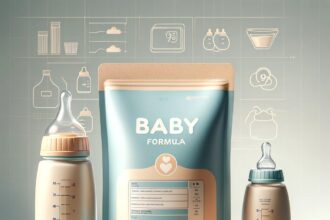As parents, the health and safety of our children is paramount. When purchasing baby food, there is an inherent trust that the products on the shelves are safe and nutritious. However, recent concerns have arisen over the role of the Food and Drug Administration (FDA) in regulating baby food, particularly concerning its potential link to necrotizing enterocolitis (NEC), a severe and sometimes fatal intestinal condition primarily affecting premature infants. This issue has led many to question whether the FDA’s current regulatory framework is robust enough to prevent such life-threatening conditions.
The FDA is responsible for ensuring that baby food products, including infant formulas, are safe for consumption. However, recent reports suggest that certain products may still pose risks to the most vulnerable populations, such as premature babies. Mass Tort America understands the gravity of this situation and is dedicated to helping families who have been affected. Our team may be able to assist in holding manufacturers accountable and seeking justice for those harmed by potentially unsafe baby food products.
Understanding Necrotizing Enterocolitis (NEC) And Its Causes
Necrotizing enterocolitis (NEC) is a devastating condition that primarily affects premature infants, causing inflammation and bacterial invasion of the intestinal wall. The exact cause of necrotizing enterocolitis is not fully understood, but it is believed to result from a combination of factors, including the infant’s immature immune system, gut bacteria, and possibly the introduction of certain foods or formulas. This condition can lead to severe complications, including bowel perforation, sepsis, and even death.
One of the major concerns is the potential link between NEC and certain baby food products, particularly those containing cow’s milk-based ingredients. Studies have shown that premature infants fed with formulas or fortifiers made from cow’s milk are at a higher risk of developing NEC compared to those fed human breast milk. This alarming connection has raised questions about the adequacy of the FDA’s regulations in protecting these vulnerable infants from such risks.
The FDA’s role in regulating baby food is to ensure that all products on the market meet certain safety standards. However, the current regulations may not be sufficient to address the specific needs of low birth weight infants. The agency has established guidelines for nutrient content, labeling, and manufacturing practices, but there is growing concern that these guidelines do not adequately account for the unique vulnerabilities of preterm and low birth weight babies either, especially in relation to necrotizing enterocolitis NEC.
FDA’s Current Regulatory Framework For Baby Food
The FDA’s regulation of baby food falls under the Federal Food, Drug, and Cosmetic Act (FD&C Act), which mandates that all food products, including those for infants, must be safe, sanitary, and properly labeled. Infant formula manufacturers are required to adhere to Good Manufacturing Practices (GMPs), and the FDA conducts inspections to ensure compliance. Additionally, the agency sets limits on contaminants in powdered infant formula, such as heavy metals, which can be harmful to infants’ developing brains.
Despite these regulations, gaps remain. For instance, there is no specific mandate for infant formula manufacturers to test for the potential of their products to cause NEC in premature infants. This lack of targeted regulation means that products containing cow’s milk-based ingredients can still be marketed as safe for all infants, despite evidence suggesting otherwise. This regulatory gap has sparked debate over whether the FDA’s current framework is sufficient to protect against the risk of NEC.
The FDA has also faced criticism for its reactive approach to food safety. Often, regulatory actions are taken only after a problem has been identified, rather than proactively preventing potential risks. In the case of NEC, this approach may not be sufficient to protect premature infants from the dangers posed by certain baby formula products. As awareness of this issue grows, there is increasing pressure on the FDA to strengthen its regulations and take a more proactive stance in preventing NEC.
Calls For Stricter Regulations And Industry Accountability
In light of the potential link between baby food and NEC, there have been growing calls for the FDA to implement stricter regulations on products intended for premature infants. Advocacy groups and healthcare providers have urged the agency to require more rigorous testing of baby food products, particularly those containing cow’s milk-based ingredients. They argue that the FDA should establish specific guidelines for products intended for preterm babies, taking into account their unique vulnerabilities and the heightened risk of NEC.
Moreover, there is a push for greater transparency and accountability within the baby food industry. Parents and caregivers have the right to know the potential risks associated with the products they feed their children. This includes clear labeling that informs consumers about the potential dangers of certain ingredients, especially for premature infants. Increased transparency can empower parents to make informed decisions and potentially reduce the incidence of NEC.
The FDA’s current approach to regulating baby food has also led to legal challenges. Families affected by NEC have begun to pursue legal action against manufacturers, alleging that they failed to adequately warn about the risks associated with their products. These lawsuits underscore the need for stronger regulations and better protection for vulnerable infants. As the legal landscape evolves, it may prompt the FDA to reevaluate its regulatory framework and take more decisive action to prevent NEC.
The Science Behind NEC: What We Know And What We Don’t
Despite decades of research, the scientific community still grapples with understanding the exact mechanisms behind necrotizing enterocolitis. This complex condition involves an interplay of multiple factors, including the infant’s immune response, the composition of gut microbiota, and the introduction of certain feeding practices, such as formula feeding with cow’s milk-based formula. Scientists agree that premature infants are particularly susceptible due to their underdeveloped immune and digestive systems.
However, much remains unknown about the specific triggers that lead to NEC. While cow’s milk-based infant formulas have been linked to higher rates of NEC, not all infants exposed to these formulas develop necrotizing enterocolitis NEC. This inconsistency suggests that other factors, such as genetic predisposition or environmental influences, may also play a role. Further research is crucial to uncovering these underlying mechanisms and developing targeted interventions.
The ongoing debate about the safety of cow’s milk-based baby food highlights the need for more robust scientific investigations. While breast milk is universally recommended for preterm infants, it is not always available, leading to reliance on infant formulas. The challenge lies in ensuring that these alternatives are safe and do not contribute to the risk of NEC. Continued research and development of safer formula options are essential to protect vulnerable infants.
The Role Of Breastfeeding In Preventing NEC
Breastfeeding has long been recognized as the gold standard for infant nutrition, particularly for premature babies. Human breast milk contains essential nutrients, antibodies, and bioactive compounds that support the infant’s immune system and promote healthy gut development. Numerous studies have shown that breastfed babies, especially those born prematurely, have a significantly lower risk of developing necrotizing enterocolitis NEC compared to those fed with formula.
The protective effect of breastfeeding against NEC is primarily attributed to the presence of immunological factors in human breast milk, such as secretory IgA, lactoferrin, and various growth factors. These components help to establish healthy bacteria in the gut, reduce intestinal inflammation, and prevent bacterial infections, all of which are critical in preventing NEC. For mothers of preterm infants, providing breast milk can be a life-saving intervention.
However, not all mothers are able to breastfeed, and in such cases, donor milk or specialized formulas, such toddler formulas such as hypoallergenic formulas or amino acid-based formulas, may be necessary. The challenge is ensuring that these alternatives provide similar protective benefits. While pasteurized donor milk retains many of the beneficial properties of fresh human milk, the processing can reduce some of its immunological components. Research into enhancing the safety and efficacy of formula alternatives remains a key priority in the fight against NEC.
Challenges In Identifying Safe Baby Food Alternatives
For families unable to rely on breastfeeding, finding safe and effective alternatives is critical. While breast milk is the ideal option, the reality is that some mothers cannot produce sufficient milk, and donor milk is not always available or affordable. This situation often leads parents to turn to formula as a primary source of nutrition for their infants. However, with the potential link between cow’s milk-based formulas and necrotizing enterocolitis NEC, the choice of formula becomes a crucial decision.
The baby food industry has made strides in developing specialized formulas designed to reduce the risk of NEC, such as those based on hydrolyzed proteins, amino acids, or lactose-free formula options. These products aim to minimize the potential inflammatory response in the infant’s gut. However, they are not without limitations. Some of these formulas may still contain traces of cow’s milk proteins, which could trigger NEC in susceptible infants.
Parents are often left navigating a confusing array of products, unsure of which is the safest option for their premature baby. The lack of clear guidance from the FDA exacerbates this uncertainty. More comprehensive labeling and stricter regulations could help parents make informed choices, reducing the risk of NEC and ensuring that all infants have access to safe and nutritious food.
The Economic Impact of NEC On Families And Healthcare
The emotional toll of NEC is immense, but the economic burden it places on families and the healthcare system is also significant. The costs associated with treating necrotizing enterocolitis can be substantial, often involving prolonged hospital stays, multiple surgeries, blood tests, and long-term medical care. These expenses can strain families financially, particularly those without adequate health insurance or access to specialized care.
In addition to direct medical costs, NEC can lead to long-term developmental issues, requiring ongoing therapy and support services. The financial implications extend beyond the initial treatment, impacting a family’s financial stability and quality of life. For many families, the economic burden of NEC is compounded by lost wages due to time spent caring for an affected child and the need for specialized childcare.
The healthcare system also bears a significant cost burden. Treating NEC is resource-intensive, requiring advanced medical interventions and specialized care teams. The high cost of treating NEC highlights the need for preventative measures, such as better regulation of baby food products, to reduce the incidence of this condition. By preventing NEC, we can alleviate some of the financial strain on both families and the healthcare system.
Legal Recourse For Families Affected By NEC
For families who believe their child developed necrotizing enterocolitis due to unsafe baby food, legal recourse may be an option. Lawsuits against infant formula manufacturers have been filed, alleging that they failed to adequately warn about the risks associated with their products, particularly those containing cow’s milk-based ingredients. These legal actions aim to hold manufacturers accountable for the harm caused and seek compensation for the affected families.
Pursuing a legal case can be daunting, especially when dealing with the complexities of product liability and medical evidence. However, families affected by NEC may have a strong case if they can demonstrate that the manufacturer knew or should have known about the risks and failed to take appropriate action. Legal cases often hinge on the ability to prove negligence or failure to warn on the part of the manufacturer.
Successful legal action can provide financial compensation to cover medical expenses, long-term care, and other related costs. It can also serve as a catalyst for change within the industry, prompting manufacturers to improve their safety practices and the FDA to strengthen its regulatory oversight. For many families, legal recourse is not just about compensation but about preventing future harm to other infants.
The Role Of Advocacy In Raising Awareness About NEC
Advocacy plays a crucial role in raising awareness about NEC and pushing for stronger regulations and better industry practices. Advocacy groups, healthcare providers, and affected families have been instrumental in bringing attention to the risks associated with certain baby food products and the need for more rigorous safety standards. Their efforts have led to increased public awareness and pressure on the FDA to take action.
One of the key goals of advocacy is to ensure that parents are informed about the potential risks and can make educated choices about their child’s nutrition. This includes advocating for clearer labeling, better access to information, and more research into the safety of baby food products. Advocacy also involves lobbying for policy changes that prioritize the health and safety of infants, particularly those born prematurely.
Through collaboration with healthcare providers, researchers, and policymakers, advocacy groups aim to create a safer environment for all infants. Their work is essential in driving the changes needed to prevent NEC and improve outcomes for affected families. By continuing to raise awareness and push for change, advocacy efforts can help protect future generations from the devastating effects of NEC.
The Global Perspective On Baby Food Regulation
While the FDA’s role in regulating baby food is crucial within the United States, it’s important to consider how other countries approach this issue. Different countries have varying standards for both baby formula and food safety, and comparing these approaches can provide valuable insights into potential improvements for U.S. regulations. Some countries, for example, have stricter guidelines on the use of cow’s milk-based ingredients in infant formulas, which may contribute to lower rates of NEC.
In Europe, the European Food Safety Authority (EFSA) plays a similar role to the FDA but operates under a different regulatory framework. The EFSA has implemented stricter controls on contaminants and requires more rigorous testing of infant formulas before they are approved for market. These differences in regulation may help explain variations in NEC incidence rates between the U.S. and other countries.
Learning from global best practices could help the FDA enhance its regulatory approach and reduce the risk of NEC among U.S. infants. By adopting more stringent safety standards and drawing on international research, the FDA can better protect vulnerable infants and provide greater assurance to parents about the safety of the baby food products they choose.
The Need For More Research And Innovation In Infant Nutrition
As the baby food industry continues to evolve, there is a growing need for more research and innovation in infant nutrition. Advances in science and technology have the potential to revolutionize the way we approach infant feeding, particularly for premature infants at risk of NEC. Research into alternative ingredients, new formulations, and enhanced processing methods could lead to safer and more effective infant formula products.
One area of innovation is the development of human milk fortifiers that do not rely on cow’s milk-based ingredients. These fortifiers, derived from human milk or plant-based sources absorb nutrients, aim to provide the necessary nutrients for preterm infants without the associated risks of NEC. Ongoing research is exploring the efficacy of these alternatives and their potential to reduce NEC incidence.
Innovation is also needed in the areas of product testing and safety assessment. The development of new testing methods that better predict the risk of NEC in premature infants could lead to more accurate and reliable safety evaluations. By prioritizing research and innovation, the baby food industry can make significant strides in protecting infant health and preventing conditions like NEC.
Parents’ Role In Preventing NEC Through Informed Choices
Parents play a crucial role in preventing necrotizing enterocolitis by making informed choices about their infant’s nutrition. While healthcare providers and regulatory agencies are responsible for ensuring the safety of baby food products, parents are the final decision-makers when it comes to what their child consumes. Being aware of the potential risks associated with certain products and understanding the importance of breastfeeding can help parents make safer choices.
It’s important for parents to have open conversations with their healthcare provider about the best feeding options for their premature baby. This includes discussing the risks and benefits of different formulas, the availability of donor milk, and the potential advantages of breastfeeding. Healthcare providers can offer guidance based on the latest research and tailored to the individual needs of the infant.
Informed decision-making also involves staying up-to-date on the latest recalls, warnings, and recommendations from the FDA and other regulatory bodies. By being proactive and vigilant, parents can help protect their infants from the risks of NEC and other food-related health issues. Educating oneself about infant nutrition and advocating for safer products can make a significant difference in a child’s health and well-being.
How Legal And Medical Communities Can Collaborate To Combat NEC
The legal and medical communities can play a vital role in combating NEC by working together to address the underlying causes and advocate for stronger protections. Medical professionals are on the front lines of identifying and treating necrotizing enterocolitis diagnosed in infants, while legal experts can help hold manufacturers accountable for any harm caused by unsafe products. Collaboration between these two fields can lead to more effective prevention strategies and better outcomes for affected families.
Medical professionals can provide crucial evidence in legal cases involving NEC, helping to establish a link between the condition and specific baby food products. Their expertise is essential in demonstrating the risks associated with certain ingredients and the potential negligence of manufacturers. Legal professionals, in turn, can use this evidence to pursue compensation for affected families and push for regulatory changes that prioritize infant safety.
By working together, the legal and medical communities can also advocate for more research funding, better education for parents, and stronger industry regulations. Their combined efforts can lead to a more comprehensive approach to preventing NEC, ensuring that all infants have the best possible start in life. This collaboration is key to making lasting changes that protect vulnerable infants and support affected families.
Can Mass Tort America Help Protect Your Family?
Navigating the complexities of a legal case involving necrotizing enterocolitis can be overwhelming, especially when dealing with the emotional toll of caring for an affected infant. Mass Tort America may be able to help families across the nation by offering support and expertise in these challenging times. Our team understands the intricacies of the law and the medical aspects of NEC, making us uniquely positioned to assist those seeking justice.
Mass Tort America offers a personalized approach, with a dedicated Concierge Team to coordinate every aspect of your case. We may be able to help you hold negligent manufacturers accountable and pursue the compensation your family deserves. If your child has been affected by NEC, contact Mass Tort America at 800-356-4338 or visit https://masstortamerica.com/contact/ to learn more about how we may be able to assist you.



















